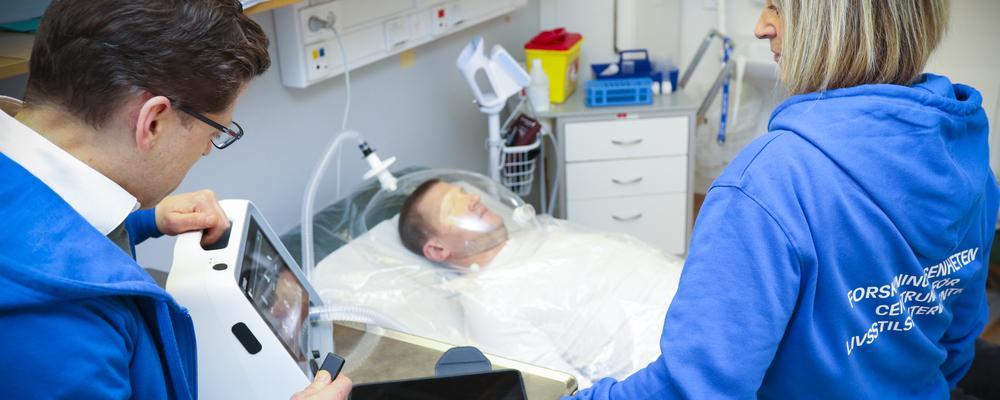
- Home
- News and events
- Find news
- Centre for Lifestyle Intervention launches its first research study
Centre for Lifestyle Intervention launches its first research study
One year after its inauguration, the Centre for Lifestyle Intervention is now embarking on a pilot project to investigate the effectiveness of personalized support over six months in reducing body weight by modifying dietary habits and physical activity among middle-aged individuals with overweight or early stage of obesity. In addition to its impact on body weight, the study also measures several modifiable risk factors for cardiovascular disease.
Carina U Persson, Associate Professor at the Department of Clinical Neuroscience, Senior Physiotherapist at Sahlgrenska University Hospital, and Coordinator at the Center for Lifestyle Intervention, comments:
"If we can identify what facilitates or hinders success in lifestyle changes, then we're onto something. Insights from this study could hopefully provide us with a basis for potential improvements to implement in clinical practice, as well as guide us in the development of future studies, including longer-term ones," says Carina Persson.
Modifiable risk factors
The pilot project, named LI-PAD, commencing at the Centre for Lifestyle Intervention, aims to include a total of 120 middle-aged individuals with overweight or early-stage obesity. Potential study participants will be randomly selected through the Swedish state personal address register. In addition to weight, researchers will also evaluate the effects on common modifiable risk factors for cardiovascular disease, such as levels of physical activity, diet, blood pressure, lipids, blood glucose, and smoking.
Mats Börjesson, Professor at the Department of Molecular and Clinical Medicine and Director of the Centre for Lifestyle Intervention, explains:
![[none]](/sites/default/files/styles/33_10_13_small_1x/public/2023-07/Mats%20Bo%CC%88rjesson.jpg?h=6e7e6a75&itok=u4UD-zEA)
"Our hypothesis is that personalized lifestyle intervention involving physical activity and diet can lead to a significant weight loss within six months. It's a form of precision health where we tailor advice on physical activity and diet to each individual, allowing them to choose how they want to carry out their activities and the type of support they prefer during the intervention," says Mats Börjesson.
Previous studies have indicated that different components of the current intervention yield effects individually, but it's not yet established how much of each component is necessary, how often follow-ups should occur, or how frequently specific support should be offered.
Needs of the participants in focus
Participants will be randomly assigned to receive either simple lifestyle advice or personalized support for changing physical activity and diet. The intervention will be tailored to the individual needs and motivation of the participants, based on their cardiovascular risk profile, other considerations, and their ability to be physically active, including their fitness level and energy expenditure. The intervention is tailored in consultation with a study nurse, study physiotherapist or a study physician.
![[none]](/sites/default/files/styles/33_10_13_small_1x/public/2024-03/Carina%20U%20Persson.jpg?h=ab30e177&itok=Xg50_9EE)
"The individual support may consist of counseling sessions and follow-up conversations led by health promoters, Lifestyle School with health promoters and physiotherapists, physiotherapist-led group cardiovascular training in a group and strength training, a six-month pass to the Valhalla Bath, lifestyle app, nudging, and phone calls. The Lifestyle Tool and Health Coach online may also be considered," explains Carina U Persson.
In contrast to similar studies focusing on improving health through exercise and diet, this study offers a variety of support and interventions. Most of these efforts are led by both health promoters and physiotherapists.
"Our advice is tailored to the individual and is not solely based on self-reported data related to diet and physical activity. We also consider the results obtained from objective assessments such as fitness level, resting energy expenditure, and accelerometer measurements, which estimate physical activity in detail," says Carina U Persson.

A year with the center
The Centre for Lifestyle Intervention is a collaboration between Sahlgrenska University Hospital and the Institute of Medicine. The center is located at the Central Clinic of Östra Hospital. Since its inauguration one year ago, it has gradually recruited staff and equipped its premises for research purposes.
During the first year of the Centre for Lifestyle Intervention, researchers at the center have co-authored 18 scientific articles, primarily focusing on method development for measuring physical activity accurately and exploring the relationship between fitness and cancer. Throughout the year, the center has also established collaborations with the Department of Nutrition and Sports Science (regarding dietary and behavioral changes in the study), as well as with the SCAPIS2 study and the H70 Clinical Studies for future research on physical activity related to health and illness.
In addition to the director Mats Börjesson and coordinator Carina U Persson, the team now includes two research nurses, a research assistant, two project-employed health promoters responsible for behavioral change and dietary advice, and two project-employed physiotherapists responsible for the part of the intervention related to cardiovascular training and strength training.
